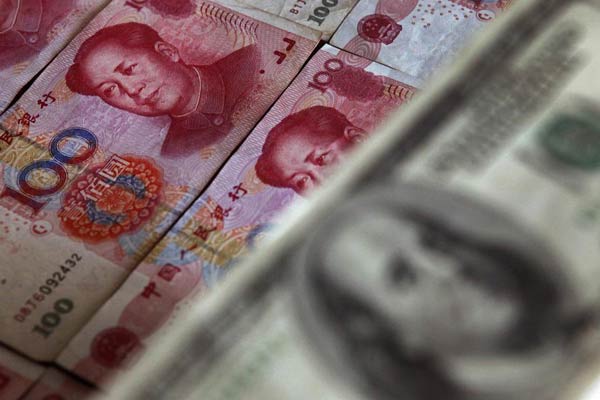 |
|
A photo illustration shows a $100 banknote placed above Chinese 100 yuan banknotes in Beijing in this May 10, 2013 file photo. [Photo/Agencies] |
For three decades now many of the world's most insightful observers have predicted imminent demise to China's system. But these same three decades have also seen China confound expectations. China's economy turned in double-digit growth rates. China lifted 600mn people out of poverty. Thirty-five years ago China's per capita income was less than US$300 (just 2 percent that of US per capita GDP) and over 800mn Chinese lived in extreme poverty; today China is the world's second-largest economy and boasts more US dollar billionaires than any other country.
But China doom-saying continues, and the first week of 2016 sent alarming signals. One respected financial analyst in London voiced what many others thought, "So far China in 2016 appears to be everyone's worst nightmare come true."
"China's system is different"
First is the long-standing view that China's system differs from what has worked everywhere else. China couples to free-market capitalism a degree of political control which many observers consider incompatible with sustained growth. The mix might have worked, so the reasoning goes, for the last however many decades but as a matter of logic the system cannot continue.
Observers advance this hypothesis on a sliding scale, beginning at one extreme with the idea that liberal democracy is the only solution to the fundamental problems of human history.
Every gyration in China's economy is then evidence on the contradictions of capitalist China. On asset markets in particular these writers contrast Chinese policymakers' proclivity for control with how these markets need to be self-regulating and free.
Individual freedom, within reason, is one of the outstanding achievements of modernity. However, notwithstanding all their obvious benefits to individuals, whether entire nations perform better when citizens have untrammeled free choice is a proposition with neither mathematical proof nor definitive empirical support. No generalization exists of the Fundamental Theorem of Welfare Economics that allows convincing pronouncement on the optimality of free political outcomes. Winston Churchill quipped democracy is the worst form of government, except for all others. But HL Mencken noted "Democracy is a pathetic belief in the collective wisdom of individual ignorance." As a matter of analytical logic, it is Mencken's that convinces.
What of empirical evidence? In the world at large, economies obtain social outcomes through different mixtures of states and markets. Singapore combined political intervention and free markets to bring it from poor British colony with no natural resources to first-world per capita GDP. No advanced Western economy practices the extreme market fundamentalism that allows financial markets to be only self-regulating and free. Or if any had done so before, exactly zero did so after the 2008 Global Financial Crisis.
It is an important proposition that political freedoms matter ultimately for economic success. But this is hypothesis, not fact. China's own pathway to development differs from that elsewhere.
China's slowing economy and its most recent crises
The second basis for predicting imminent collapse, for many observers, is China's cycle of economic and financial crises. Just the most recent of these came the first week of 2016.
After China's financial market volatility last summer, regulators announced circuit-breakers to be installed in the new year. When the market shifts more than 5 percent, trading halts for 15mins; more than 7 percent suspends trading for the day. Awkward for China's regulators was that on the first day of operation their circuit-breakers had shut down the market by 1pm. Then, only three days later, on Thursday 07 January the market was again forced to close, this time just 29 minutes after the morning opening.
Two other developments fuelled unease. In December 2015 China's foreign exchange reserves fell a record US$108bn, ending a year that saw their first ever annual decline. Reserves were down 17 percent to US$3.33tn since their June 2014 peak: China was burning through foreign exchange reserves to defend its currency. Even so, the RMB fell 6 percent against the US dollar over 2015, showing markets' lack of confidence in China's economic future.
The other large concern on observers' minds was China's slowing real economy. A long way now from showing double-digit growth, China's GDP was widely expected to turn in perhaps only 6.9 percent expansion over 2015. (And indeed it ended up doing exactly that.) While this growth rate would have been the envy of any other large economy, it is also China's lowest for 25 years.
Many observers quickly drew from these signals deeper concerns. Given China's assured economic policy-making since 1990, why this sequence of missteps? How well-designed are China's policy mechanisms for its now-modern economy, no longer agricultural and enjoying smooth, easy urbanization? Are China's policy-makers credible and competent, now the economy needs to transform in a hurry, from low value-added manufacturing to higher-tech, knowledge-intensive activity, from investment and export-oriented to one driven by domestic consumption?
For these observers all indicators point in one direction. "China's downturn will be significant. The only question is how hard the landing."